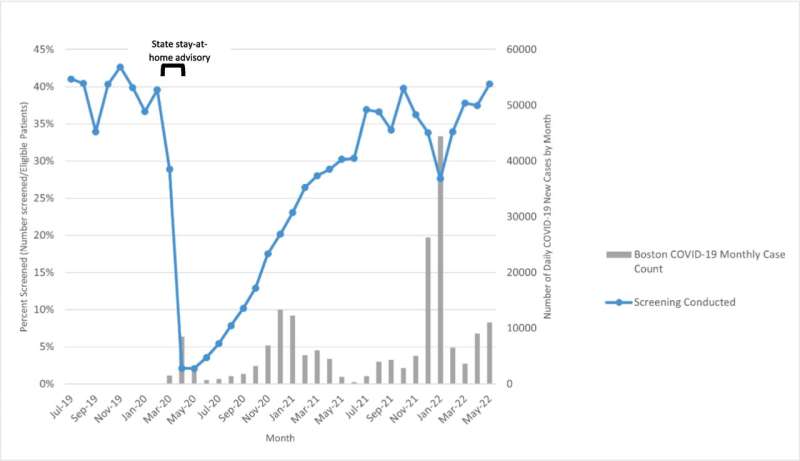This article has been reviewed according to Science X's editorial process and policies. Editors have highlighted the following attributes while ensuring the content's credibility:
fact-checked
trusted source
proofread
Alcohol screening rates dropped substantially during the first COVID-19 surge, finds study

New research from Boston Medical Center found that alcohol screening rates dropped substantially during the first COVID-19 surge. Published in Preventive Medicine Reports, the study highlights that during the COVID-19 pandemic, there were increases in unhealthy alcohol consumption and alcohol related morbidity and mortality.
In 2021, over 50% of U.S. adults drank alcohol in the past month with over 25% reporting binge drinking, an increase from previous years. Alcohol use is associated with increased risk of accidents, poor birth outcomes including fetal alcohol spectrum disorders, cancer, chronic diseases, and mortality.
Universal screening for unhealthy alcohol use and counseling those identified in primary care is an effective prevention strategy. While most routine preventive health screenings, like mammograms and colonoscopies, cannot be completed virtually, virtual screenings for unhealthy alcohol use is possible.
"Due to the importance of prevention through universal, annual alcohol screening, especially given the increases in alcohol related morbidity and mortality during the pandemic, innovative workflow strategies should be considered and prioritized to avoid interruptions of screening for unhealthy alcohol use in primary care," said lead author Dan Alford, MD, MPH, a primary care physician at Boston Medical Center and Professor of Medicine at Boston University Chobanian & Avedisian School of Medicine.
"We hope that this study highlights the importance of continuing to implement important behavioral health screenings even during challenging periods."
This study examined alcohol screening rates in primary care practices in Boston, MA in the context of the COVID-19 pandemic, from July 2019 through May 2022. Screening rates were mapped, by month, to the number of COVID-19 cases. Alcohol screening dropped substantially during the first COVID-19 surge but steadily increased to baseline between the second and third surges.
This decline was likely due to competing pandemic-related priorities and the transition to telemedicine. During the early stages of the pandemic, urgent care issues were prioritized by both patients and clinicians over routine health care maintenance. Shifting to telemedicine also likely impacted alcohol screening at the clinician- and system-level.
During virtual visits, clinicians are often responsible for all aspects of patient care without the assistance of support staff, who regularly oversee and perform behavioral health screenings. Later surges had less impact on screening rates likely due to return of some in-person team-based care, less focus on COVID-related issues during visits, and improvements in telemedicine workflows.
Researchers believe that future studies should explore whether the frequency of screening was different between telemedicine and in-person visits during the same time-period, as well as broader explorations of patient-, clinician- and system-level causes for the changes observed.
More information: Daniel P. Alford et al, Alcohol screening during COVID-19 surges in an urban health system the United States, Preventive Medicine Reports (2023). DOI: 10.1016/j.pmedr.2023.102197




















